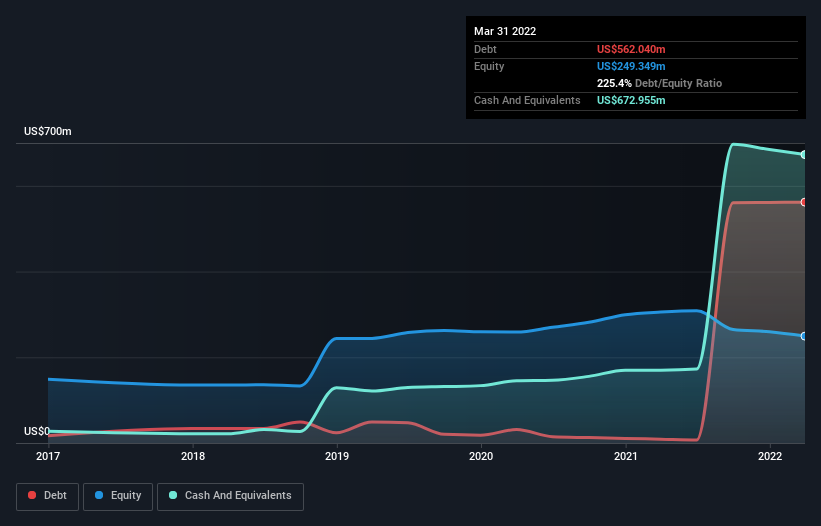Is Upwork (NASDAQ:UPWK) Weighed On By Its Debt Load?
Legendary fund manager Li Lu (who Charlie Munger backed) once said, 'The biggest investment risk is not the volatility of prices, but whether you will suffer a permanent loss of capital.' When we think about how risky a company is, we always like to look at its use of debt, since debt overload can lead to ruin. As with many other companies Upwork Inc. (NASDAQ:UPWK) makes use of debt. But the real question is whether this debt is making the company risky.
Why Does Debt Bring Risk?
Debt assists a business until the business has trouble paying it off, either with new capital or with free cash flow. Ultimately, if the company can't fulfill its legal obligations to repay debt, shareholders could walk away with nothing. However, a more frequent (but still costly) occurrence is where a company must issue shares at bargain-basement prices, permanently diluting shareholders, just to shore up its balance sheet. Having said that, the most common situation is where a company manages its debt reasonably well - and to its own advantage. When we examine debt levels, we first consider both cash and debt levels, together.
See our latest analysis for Upwork
What Is Upwork's Net Debt?
The image below, which you can click on for greater detail, shows that at March 2022 Upwork had debt of US$562.0m, up from US$8.85m in one year. However, it does have US$673.0m in cash offsetting this, leading to net cash of US$110.9m.
A Look At Upwork's Liabilities
According to the last reported balance sheet, Upwork had liabilities of US$263.3m due within 12 months, and liabilities of US$587.6m due beyond 12 months. Offsetting this, it had US$673.0m in cash and US$62.0m in receivables that were due within 12 months. So its liabilities outweigh the sum of its cash and (near-term) receivables by US$115.9m.
Of course, Upwork has a market capitalization of US$2.88b, so these liabilities are probably manageable. Having said that, it's clear that we should continue to monitor its balance sheet, lest it change for the worse. Despite its noteworthy liabilities, Upwork boasts net cash, so it's fair to say it does not have a heavy debt load! The balance sheet is clearly the area to focus on when you are analysing debt. But ultimately the future profitability of the business will decide if Upwork can strengthen its balance sheet over time. So if you're focused on the future you can check out this free report showing analyst profit forecasts.
In the last year Upwork wasn't profitable at an EBIT level, but managed to grow its revenue by 31%, to US$531m. Shareholders probably have their fingers crossed that it can grow its way to profits.
So How Risky Is Upwork?
By their very nature companies that are losing money are more risky than those with a long history of profitability. And in the last year Upwork had an earnings before interest and tax (EBIT) loss, truth be told. And over the same period it saw negative free cash outflow of US$7.7m and booked a US$73m accounting loss. Given it only has net cash of US$110.9m, the company may need to raise more capital if it doesn't reach break-even soon. With very solid revenue growth in the last year, Upwork may be on a path to profitability. Pre-profit companies are often risky, but they can also offer great rewards. The balance sheet is clearly the area to focus on when you are analysing debt. However, not all investment risk resides within the balance sheet - far from it. For instance, we've identified 3 warning signs for Upwork that you should be aware of.
If you're interested in investing in businesses that can grow profits without the burden of debt, then check out this free list of growing businesses that have net cash on the balance sheet.
Have feedback on this article? Concerned about the content? Get in touch with us directly. Alternatively, email editorial-team (at) simplywallst.com.
This article by Simply Wall St is general in nature. We provide commentary based on historical data and analyst forecasts only using an unbiased methodology and our articles are not intended to be financial advice. It does not constitute a recommendation to buy or sell any stock, and does not take account of your objectives, or your financial situation. We aim to bring you long-term focused analysis driven by fundamental data. Note that our analysis may not factor in the latest price-sensitive company announcements or qualitative material. Simply Wall St has no position in any stocks mentioned.

 Yahoo Finance
Yahoo Finance 
